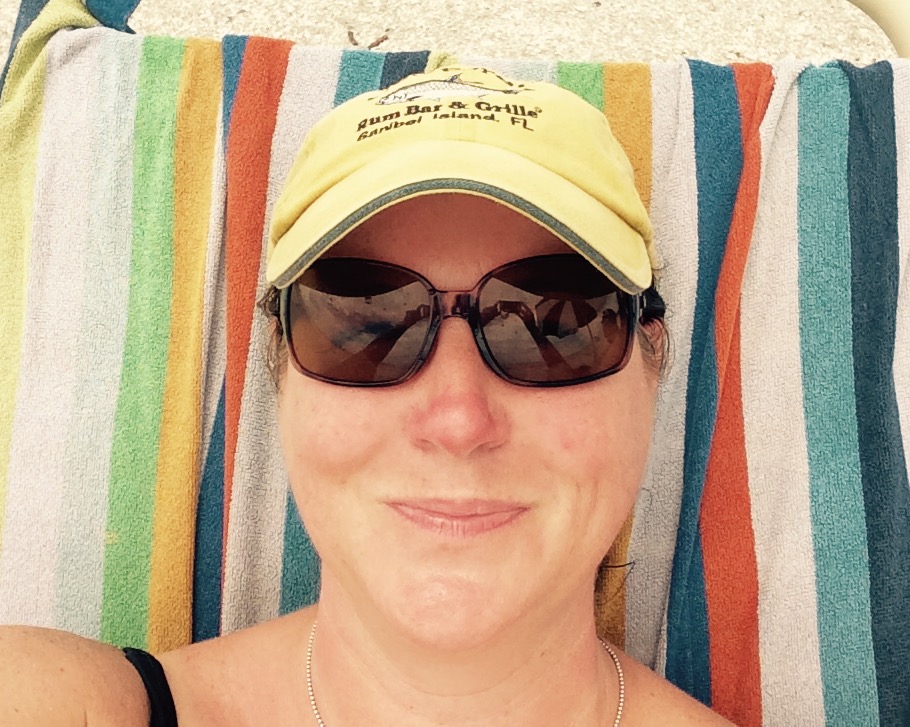
Carrie Easley
Reputation Activity
-
 Carrie Easley got a reaction from David Saikin in Immucor FMH RapidScreen ABO incompatibility
Carrie Easley got a reaction from David Saikin in Immucor FMH RapidScreen ABO incompatibility
We perform a gentle heat elution. If we successfully attain a negative DAT after the elution, we test baby for weak D.
-
 Carrie Easley reacted to tbostock in Informed consent. Who explains risks/benefits?
Carrie Easley reacted to tbostock in Informed consent. Who explains risks/benefits?
Yes, informed consent is part of physician credentialing. It cannot be done by the nurse. You could have your nurses offer an info sheet to patients, but the conversation about risks, benefits, alternatives, and consequences of refusal MUST be a conversation between patient and physician/provider (can be PA or NP but not an RN).
-
 Carrie Easley reacted to AMcCord in Informed consent. Who explains risks/benefits?
Carrie Easley reacted to AMcCord in Informed consent. Who explains risks/benefits?
Informed consent should be done by the physician, as it is for other treatments/procedures. Risk/benefit explanations should be done by the individual ordering the transfusion as he/she is the person who is 'supposed' to be most familiar with the patient's condition. For some reason, consent for transfusions isn't taken as seriously as it should be. Shoving the responsibility onto nursing staff isn't fixing the problem. That's a tough one but it's something that I think is going to be a TJC issue - once a problem fits in that category, you have more teeth to address it.
-
 Carrie Easley reacted to kate murphy in Informed consent. Who explains risks/benefits?
Carrie Easley reacted to kate murphy in Informed consent. Who explains risks/benefits?
In Massachusetts, it's the physicians.
We audit a small percentage of transfusions every month, and consent in one of the things we look for. We've stopped "letters from the committee" as they are ignored. We report No Consent directly to Patient Safety/Risk Management. The hospital lawyers then contact individual MD and their chiefs. This is also reviewed at Medical Executive meetings. Very rarely now do we miss a consent.
The higher up the food chain you report, the better the results.
-
 Carrie Easley reacted to mollyredone in Informed consent. Who explains risks/benefits?
Carrie Easley reacted to mollyredone in Informed consent. Who explains risks/benefits?
I know that it is the law in Washington and Oregon to have the physician obtain informed consent. I don't know about other states. I also know that it is rarely done here by physicians, even though all other treatments or procedures are explained by the physician. I don't know why transfusion is being treated differently, but we have a new QI person and TJC will be inspecting soon, so hopefully they will decide to follow the law! Plus, it is very rarely fully completed here and I have beaten my head against the wall many times trying to get compliance. I just might make a comment when TJC comes in to talk to blood bank, even though the lab is inspected by CAP.
-
 Carrie Easley reacted to Malcolm Needs in Informed consent. Who explains risks/benefits?
Carrie Easley reacted to Malcolm Needs in Informed consent. Who explains risks/benefits?
If there isn't, there should be. As I have said many times on this site, I have a huge respect for nurses, but they cannot be expected to keep up to date with all of the latest reasons why a transfusion is, or is not the best or safest treatment for a particular patient, with a particular condition. It is equally difficult for a doctor to keep up-to-date, but it is easier to keep the Consultant Physician/Surgeon abreast of such things, via the Haematologist, and for him/her to cascade this "news" to their staff, and these more junior doctors would also have the knowledge (or should have the knowledge) to answer any of the patient's questions on the subject honestly.
-
 Carrie Easley got a reaction from Ensis01 in Gestational age for fetal screen
Carrie Easley got a reaction from Ensis01 in Gestational age for fetal screen
I'm not sure I understand the question...
In order to perform a fetal screen (rosette test), you must know the infant's Rh type as it is not valid on a weak D infant. This is rarely known in an early loss. For a loss/bleeding up to 20 weeks gestation, we do an antibody screen to make certain that the mother is not previously sensitized to D, and give one full dose. After 20 weeks, we would perform a Kleihauer-Betke for a loss/bleed if the infant's type is unknown to determine if > one vial is needed.
-
 Carrie Easley got a reaction from Ensis01 in Blood Requests after a Transfusion Reaction Workup
Carrie Easley got a reaction from Ensis01 in Blood Requests after a Transfusion Reaction Workup
Our basic post-transfusion work up includes clerical check, hemolysis check (pre & post), icterus check (pre & post), post ABO/Rh, post DAT, pre DAT if post was +, elution if the post DAT is stronger than pre. Additional testing is ordered if any of these results dictate. A blood culture of the bag is requested if there is unexplained hemolysis in the recipient, or when a fever greater than or equal to 39 degrees C. or an increase in temperature of at least 2 degrees C over pre-transfusion temperature is reported.
We encourage and constantly educate nurses to identify and call transfusion reactions. We have found that physicians tend to be dismissive, and want the unit continued. An area hospital actually transfused the entirety of a contaminated platelet because the physician paused, gave Tylenol, and continued the unit. The patient died.
Hives/urticarial only requires clerical check. We require pathologist OK prior to issuing another unit. The only time we will allow a transfusion to continue is if hive/urticaria are the only symptoms.
We continue using the original specimen for crossmatch.
-
 Carrie Easley got a reaction from dragonlady97213 in What is possible thing will occurs when we give B+ PRBCs for A+ female patient ?
Carrie Easley got a reaction from dragonlady97213 in What is possible thing will occurs when we give B+ PRBCs for A+ female patient ?
I assume the clinical pathologist has been notified of this sentinel event? They should be involved in the management of the patient and subsequent reporting to appropriate agencies.
-
 Carrie Easley got a reaction from TreeMoss in Immucor FMH RapidScreen ABO incompatibility
Carrie Easley got a reaction from TreeMoss in Immucor FMH RapidScreen ABO incompatibility
We perform a gentle heat elution. If we successfully attain a negative DAT after the elution, we test baby for weak D.
-
 Carrie Easley reacted to Brenda K Hutson in Grifols Erytra
Carrie Easley reacted to Brenda K Hutson in Grifols Erytra
So we went LIVE with our Erytra this week. We had a couple of hardware issues along the way (though nothing major). One change I made (and this was just a personal decision) to prophylactically prevent 1 type of issue, is that we changed the double-layer racks to single layer (so when we take them out of the box....we have saved empty racks after use so we place the top layer in a 2nd rack). We do that because in training, they emphasize how you have to make sure the cards are patted down; that a corner doesn't pull back up, like maybe from your glove sticking; that the drawers must be closed very carefully or it could jar the cards. Well, you can "teach" your staff all of those things, but you KNOW it is going to happen (some heavy-handed tech. is going to come along and just slam the door shut.....then you are in trouble ). So by making single-layer racks, we hope to decrease gripper vs. card issues. Our workload is not so high that we needed the 2nd layer....even filling the Erytra with single-layer card racks in every space, is more than we would use in 24 hours. One thing to be careful with if you do that though is that when you are handling the cards, do it gently so as not to cause splashing within the wells; otherwise, you create another problem. Another change we made is that it was initially connected to a drain. After training (and learning to do decontamination), we decided to have it switched to reagent waste bottles. Again, our workload is such that we would not even fill 1 of those bottles in 24 hours much less 2; so we cut down on the tedious decontamination process.
You also learn some things the hard way.....like if you remove a solution bottle to add more solution, don't close the drawer! If you do and the analyzer is priming (or wants it for something else), it will disable the probes. So leave the drawer open during the process. There were several things like that we learned by making the mistake. The more we use it, the more we learn (there is a lot to learn with the touchscreen).
But we still really like it. There are some software changes we would like so they are adding them to a new version coming out next year. Also, they definitely need to "beef up" their panels (and they know that).
All in all.....a good purchase. My only outstanding concern is some missed weak antibodies (which we will continue to watch for.....for now, every questionable antibody screen will be repeated by Tube PeG).
Brenda Hutson, MT(ASCP)SBB
-
 Carrie Easley got a reaction from R1R2 in Grifols Erytra
Carrie Easley got a reaction from R1R2 in Grifols Erytra
Currently validating our new Erytra, and am really pleased. All of the techs who have used it so far love it. Incredibly simple to use and very intuitive. Grifols is working on liquid antisera that can be used on the analyzer for both patients and units. Really looking forward to that as well as a short panel to rule-out passive RhIg. When you consider the number of cards that can be stored on-board, it's not leaving any bigger footprint than our ProVue. 28 minute STAT T&S (2cell) from the time we put the specimen on!
-
 Carrie Easley reacted to exlimey in Expired Panel Cells
Carrie Easley reacted to exlimey in Expired Panel Cells
I see your point SMILLER/Scott. It's a fair argument. I'm not advocating "less oversight", but merely acknowledgement that an immunohematology work-up often has a lot more "grey/gray" than the other pathology disciplines. As we all know, "antibodies don't read books" and sometimes it takes all of your resources and experience to resolve a serological problem, including the prudent use of expired materials (or frozen inventory).
One could argue that absolute prohibition of using expired reagents in such cases could potentially put a patient at more risk by leaving an issue unresolved. Using all of your tools, in-date or otherwise, to get a good answer might outweigh the regulatory implications.
As I alluded to earlier......I don't recommend front-line techs use expired reagents willy-nilly - they should be used surgically and by those skillful enough to recognize the limitations.
-

-
 Carrie Easley reacted to exlimey in Expired Panel Cells
Carrie Easley reacted to exlimey in Expired Panel Cells
Sometimes I think that the "regulators" feel obliged to fix problems that don't exist. Does anyone recall a rash of patient morbidity/mortality due to the use of expired reagents in the blood bank arena?
That being said, the use of such material should be restricted to those with the appropriate knowledge and expertise.
-
 Carrie Easley got a reaction from AMcCord in Routine Testing on Newborns
Carrie Easley got a reaction from AMcCord in Routine Testing on Newborns
I will say that the only reason we have such compliance on antibody moms is due to the blood banker calling L&D and telling the nurse that a cord needs to be collected. If they fail to, we ask for a heel stick.
-
 Carrie Easley got a reaction from AMcCord in D typing
Carrie Easley got a reaction from AMcCord in D typing
Our primary method is gel. If we get =/< 2+ reactivity (on someone pregnant or with childbearing potential), we repeat with tube reagents to see if it reacts at IS. If not, we incubate @ RT for 15minutes. If tube reactivity is not 2+ or more, we tentatively call the patient Rh- and request an order for Rh genotyping from the physician. The vast majority do come back as being a variant that can be treated as Rh+ for transfusion/RhIg purposes. There have been a couple that we were told have the potential to make an anti-D.
I uploaded one reference to the library under Educational Materials. There was also a good article in Transfusion Volume 55, March 2015
-
 Carrie Easley got a reaction from Malcolm Needs in D typing
Carrie Easley got a reaction from Malcolm Needs in D typing
Our primary method is gel. If we get =/< 2+ reactivity (on someone pregnant or with childbearing potential), we repeat with tube reagents to see if it reacts at IS. If not, we incubate @ RT for 15minutes. If tube reactivity is not 2+ or more, we tentatively call the patient Rh- and request an order for Rh genotyping from the physician. The vast majority do come back as being a variant that can be treated as Rh+ for transfusion/RhIg purposes. There have been a couple that we were told have the potential to make an anti-D.
I uploaded one reference to the library under Educational Materials. There was also a good article in Transfusion Volume 55, March 2015
-
 Carrie Easley got a reaction from gagpinks in Routine Testing on Newborns
Carrie Easley got a reaction from gagpinks in Routine Testing on Newborns
We only routinely get cords on Rh negative moms & moms w/ a clinically significant antibodies. Occasionally a physician will request one on an O mom who has had a previously affected infant, but it’s not very common. If a baby didn’t have a cord performed, and there are concerns of jaundice later, we have a separate test order for the ABO/Rh/DAT drawn via venipuncture or heel stick.
-
 Carrie Easley got a reaction from Malcolm Needs in What is possible thing will occurs when we give B+ PRBCs for A+ female patient ?
Carrie Easley got a reaction from Malcolm Needs in What is possible thing will occurs when we give B+ PRBCs for A+ female patient ?
I assume the clinical pathologist has been notified of this sentinel event? They should be involved in the management of the patient and subsequent reporting to appropriate agencies.
-
 Carrie Easley got a reaction from dragonlady97213 in Routine Testing on Newborns
Carrie Easley got a reaction from dragonlady97213 in Routine Testing on Newborns
We only routinely get cords on Rh negative moms & moms w/ a clinically significant antibodies. Occasionally a physician will request one on an O mom who has had a previously affected infant, but it’s not very common. If a baby didn’t have a cord performed, and there are concerns of jaundice later, we have a separate test order for the ABO/Rh/DAT drawn via venipuncture or heel stick.
-
 Carrie Easley reacted to Marianne in Chief Technologist
Carrie Easley reacted to Marianne in Chief Technologist
I have also always used the "current edition" phrase in my references to prevent constant changes. I have never had an issue with FDA, AABB or CAP. What you do need to have is some type of change management process and documentation that shows that when applicable regs change, that you reviewed and updated as needed.
-
 Carrie Easley got a reaction from Malcolm Needs in Routine Testing on Newborns
Carrie Easley got a reaction from Malcolm Needs in Routine Testing on Newborns
We only routinely get cords on Rh negative moms & moms w/ a clinically significant antibodies. Occasionally a physician will request one on an O mom who has had a previously affected infant, but it’s not very common. If a baby didn’t have a cord performed, and there are concerns of jaundice later, we have a separate test order for the ABO/Rh/DAT drawn via venipuncture or heel stick.
-
 Carrie Easley got a reaction from ffriesen in Routine Testing on Newborns
Carrie Easley got a reaction from ffriesen in Routine Testing on Newborns
We only routinely get cords on Rh negative moms & moms w/ a clinically significant antibodies. Occasionally a physician will request one on an O mom who has had a previously affected infant, but it’s not very common. If a baby didn’t have a cord performed, and there are concerns of jaundice later, we have a separate test order for the ABO/Rh/DAT drawn via venipuncture or heel stick.
-
 Carrie Easley reacted to AMcCord in pre-transfusion sample aliquot
Carrie Easley reacted to AMcCord in pre-transfusion sample aliquot
We've never separated samples and I've been doing this for 30+ years. We routinely add crossmatches to previously drawn specimens and do not experience problems using those samples. There are a very few specific times when separating a sample can be helpful, but I haven't had one of those events for years. Actually I can't remember the last time I did separate a sample. Our reference lab hasn't required separated plasma/red cells in a long time. It would be interesting to know why your reference lab requires it for all samples.
I would recommend against the practice of sample separation.



